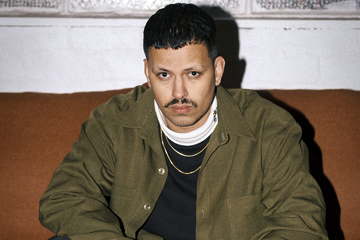Emily Copeland At BIGSOUND: 'The Selling Power Of Triple J Still Exists'
While Copeland didn’t tackle the almost impossible discussions around rating, relevance, and the regions, she did prove that the ABC continues in the right direction.

Emily Copeland at BIGSOUND (Credit: Mick Radojkovic)
If there’s anything that the music media industry loves more, it's expressing its opinions of triple j and explaining why, how, and when it has changed or become “not like it used to be.”
Emily Copeland is here to tell you, you’re full of shit.
Not only is triple j still relevant, but it’s fulfilling the mandate that it always has - playing stuff that you won’t hear anywhere else for a young adult demographic and – most importantly – supporting the local music scene.
Let’s be clear: this panel was never going to explain why triple j doesn’t get the ratings that it used to or to give us a chance to complain about the music choices, but it did give us a chance to meet and learn about their newest player in Emily Copeland, the newly appointed Head of Music.
With a diverse employment history in community radio, music television and commercial radio, Copeland has had a unique chance to dabble in all sides of the musical broadcast scene and lands at the ABC in a newly created position with the opportunity to spark a new generation with the departure of the beloved (and often unfairly maligned) Richard Kingsmill.
Copeland works with a remit that covers triple j, Double J, Unearthed, ABC Classic, and local radio. This chalice is not only poisoned but continually fed by a hungry media, devoted audience, and expectant taxpayer.
Don't miss a beat with our FREE daily newsletter
After highlighting the fact that ABC has encountered its biggest management shake-up in 20 years, Copeland went on to explain how she has immersed herself in the new position, which has only been over three months, and how important listening has been to the role.
She elaborated on the impression that ABC music meetings have had where she highlighted “the balance between the sheer amount of music and the time that it takes” but also that every song uploaded to triple j Unearthed is “listened to in full”. She made sure to highlight how important the curation of the ABC music brand is before shouting out members of the music direction team in the audience, including Nick Findlay and Dorothy Markek.
The later part of her conversation with experienced artist manager and former ABC and FBi colleague Jess Keeley centred around dispelling some myths prevalent about triple j in the industry.
“Why is triple j becoming so commercial?” It’s a common question and one that Copeland responded to with facts and figures. It’s an argument that has been posed for a decade, but the facts speak for themselves.
When referring to the top 20 most played singles of August 2024, Copeland compared those with the playlists from commercial stations such as KIIS, Hit FM and Nova. Only three tracks from the top 20 had been played by these commercial stations in that month, and only one had been played more than once. That honour goes to Budjerah’s Is It Ever Gonna Make Sense.
It was an important factual reference that immediately dispelled the myth that triple j only plays commercial music. In fact, they are still promoting music that is not played anywhere else, and that is something to be celebrated.
To further solidify this fact, Copeland went on to explain why Sabrina Carpenter was not playlisted, even though her popularity amongst the triple j demographic is substantial. “We decided to give local artists support first.” This is not an insignificant decision and highlights the priorities of a station that is often accused of pandering to youth commercial tastes.
Copeland rounded out her argument by saying that the returning One Night Stand, being hosted in Warrnambool, has sold fifteen thousand tickets in a day, reinforcing the fact that “the selling power of triple j still exists.”
Copeland went on to express dismay at the negative media coverage of the Australian music industry, and in particular, the national broadcaster, and appreciated that the “opportunity to reach an audience is immense.”
Quoting the ABC Chairman, Kim Williams, she also iterated that the public broadcaster should focus on “Community, togetherness and conversation” and what music people would like to hear around the national campfire.
Ultimately, whilst the discussion didn’t tackle the almost impossible discussions around rating, relevance, and the regions, it did promote positivity that the ABC is still looking in the right direction when it comes to promoting local artists.







